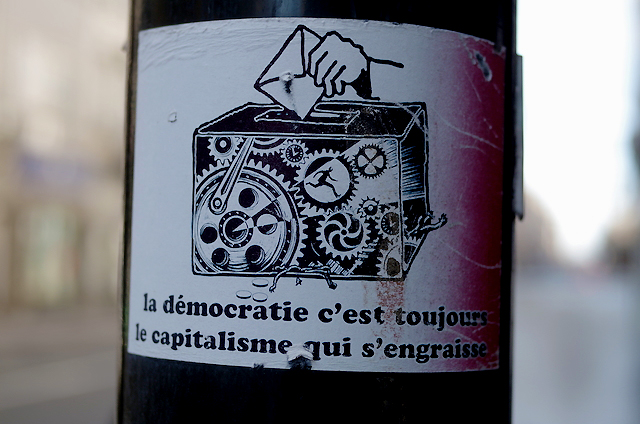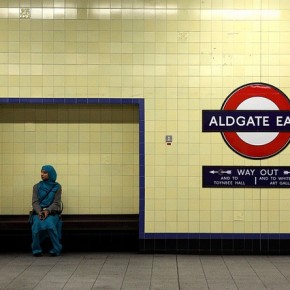The best political slogans aren’t those you chant ritualistically, like a machine, but the ones that stop you in your tracks for a minute and make you think. Take this sticker from Brussels: “Democracy is always capitalism getting fat.” What makes this formulation so provocative is the black-or-white worldview that it expounds.
It refuses to acknowledge the possibility that the political realm might have a measure of autonomy. And it also rejects a historical approach that traces the roots of democracy back to a pre-capitalist age, whether golden or tarnished.
For the purposes of this equation, we are trapped in a perpetual “now” in which democracy is always subordinated to the power of capital. Is this really true? No matter how suspicious we are of politicians and how skeptical of our fellow citizens’ wisdom in choosing them, to agree with this dark assessment 100% is difficult. Something inside us wants to believe that, all evidence to the contrary, the way contemporary “democracies” function is the exception rather than the rule.
From this perspective, the problem isn’t that our political ideal is unrealistic, but that our vision of reality is distorted. All we have to do is set aside our petty grievances and acknowledge that our deepest longing is to make decisions together. Perhaps we simply need to reduce the scope of our community, retreating from economies of scale, in order to realize Rousseau’s vision of the social contract. The chains that bind us are an external impediment rather than an internal defect.
The slogan on this sticker repudiates such optimism by definition, confronting us with the image of a predator, capitalism, and the prey it feasts on, legitimation. But what if we turn take the s’engraisse here as literally as possible. To be sure, we speak of wolves getting fat on sheep, as if there were no negative consequences for those higher up in the food chain. If wolves really got fat, though, consuming a surplus above and beyond the sustenance they require, they would eventually suffer from carrying that extra weight.
A capitalism that has “gotten fat” on votes that merely ratify the pursuit of profit is, at least potentially, a capitalism that has made itself vulnerable. And there’s a good change the creators of this slogan had this idea in mind, given their revolutionary aspirations. Yet their antipathy towards actually existing democracy seemingly blinds them to the full implications of this scenario.
Maybe the democracy we want to believe in, against our better judgment, will never live up to its ideals. There is a chance, though, that precisely in this failure — in its being preyed upon by capitalism — it might paradoxically nudge us in the direction of a better future. That is what Marx and Engels argued, after all.
Everyone seems to remember the most strident passages of The Communist Manifesto, the ones heralding a radical transformation of society, but not the ones in which the pamphlet’s authors advocate working together with those content to install constitutional democracies where capitalism would be given free reign. To forget this is to overlook a crucial lesson: sometimes you have to feed the beast in order to bring it down.
Commentary by Charlie Bertsch. Photograph courtesy of Joel Schalit.





